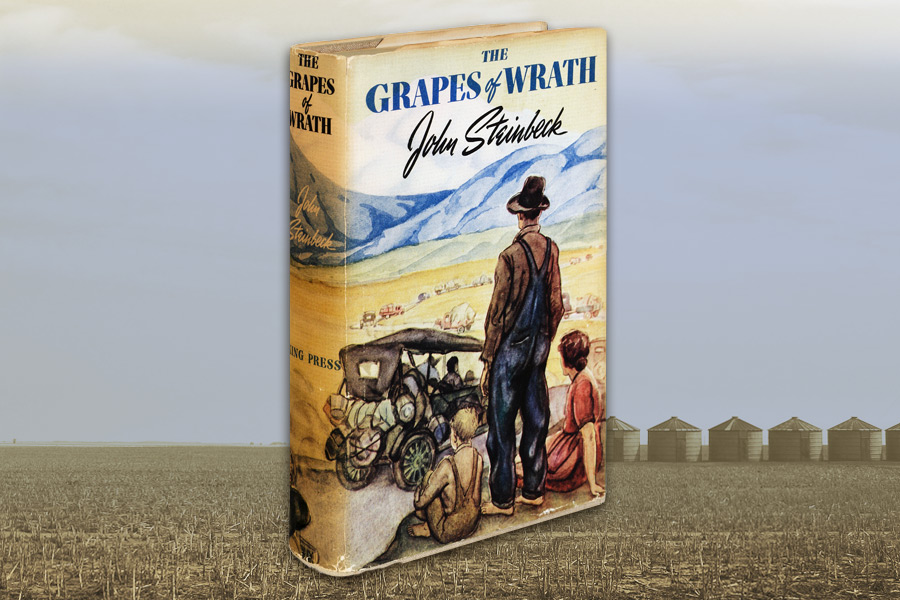By the Book: 'The Grapes of Wrath' at 75' – Still Ripening

2014 marks the 75th anniversary of the publication of John Steinbeck’s The Grapes of Wrath. Steinbeck was a longtime resident of Sag Harbor and one of the Old Whalers Festival (now “HarborFest”) founders. His image graces the memorial windmill across the wharf from the Bay Street Theater.
The Grapes of Wrath won the National Book Award in 1939 and, a year later, the Pulitzer Prize for fiction. But many Americans know this great American classic only by way of John Ford’s 1940 film starring Henry Fonda as Tom Joad—unless they were required to (and actually did) read it.
The book inspired folk songs, theatrical adaptations and, of course, the film, while the title (from Revelations 14:19 and the 1861 “Battle Hymn of the Republic”) developed a critical life of its own, as ambiguous as the novel is clear and accessible. About his motives, Steinbeck, who came from a comfortable background, wrote that he wanted “to put a tag of shame on the greedy bastards” responsible for the Great Depression, and that he did his “damndest to rip a reader’s nerves to rags.” That passion won him sympathizers, but also opponents, many of whom denounced him as a liar and a “Red.” (The book was banned from schools and libraries in his home county of Salinas, CA until 1941.) Indeed, it could be said that the novel makes a persuasive case for labor unions because it depicts the brutality unleashed on those who try to band together to fight horrific exploitation and cruelty. Driven off their land by tractors and banks and manipulated into working for nothing by greedy farm owners, hundreds of thousands took to the road where they heard there was work. Impoverished, depressed, many succumbed to starvation and disease.
For sure, in light of the current conditions of Latino migrants and our country’s growing disparity between rich and poor, The Grapes of Wrath has timely significance, but it must also be said that it deserves to be re-read because it is well written. Steinbeck skillfully alternates stretches of dialogue, in dialect, with third-person overviews that fold the plight of the Joad family into a sweeping indictment, turning a family story into an iconic American epic. Route 66, later to be the subject of a jazz song, was in this ’30s classic “the mother road, the road of flight… A half million; people restive, ready to move, 10 million more feeling the first nervousness And tractors turning the multiple furrows in the vacant land.”
Although huge snatches of scenes and dialogue were used in the movie, no visuals can deliver the equivalent of Steinbeck’s stark imagery, blunt diction and incantatory prose—Biblical rhythms wrought with clauses linked by coordinating conjunctions invoking the malign forces of nature, and of human nature. The movie ends on a somewhat hopeful note, the book is dark and unyielding. In the movie, Ma Joad delivers the famous “we’re the people” speech, after the family has arrived in a well-run government camp. This scene comes in the middle of the novel, however, which then moves implacably toward a horrific conclusion. Tom has left, and though his lines, also, have become famous—“Wherever they’s a fight so hungry people can eat, I’ll be there. Wherever they’s a cop beatin’ up a guy, I’ll be there . . . An’ when our folks eat the stuff they raise an’ live in the houses they build—why—I’ll be there”—nothing can alter the tragic course the Joads are on: the disintegration of the family, torrential rains. They leave the good government camp because they can’t find work, but it will be burned down anyway, and when some of the Joads do get temporary day jobs picking peaches for 5 cents per box, Tom soon finds himself in a nightmare scenario of strike-breaking brutality and exploitation, when five cents is reduced to two.
Steinbeck bookends the story with scenes of rain, an opening sentence where gentle rains “did not cut the scarred earth,” and at the end, a devastating flood. The Joad boys are scattered to the winds. “We can’t start again.”
But what of the possible promise of the title? Steinbeck uses the phrase only once. “In the souls of the people the grapes of wrath are filling and growing heavy, growing heavy for the vintage.” Deep anger is what keeps people from fear and despair. But someday, Steinbeck also writes, “the armies of bitterness will all be going the same way. And they’ll all walk together, and there’ll be a dead terror from it.” Not if the combine owners have their way. Or if states now in the path of Latino immigrants shut down borders. Or if the violent vindictive prophecy of Revelations plays out: “So the angel swung his sickle to the earth and gathered the clusters from the vine of the earth, and threw them into the great wine press of the wrath of God. And the wine press was trodden outside the city, and blood came out from the wine press…” If God’s truth marches on, as Julia Ward Howe wrote, it will be because God “hath loosed his fateful lightning” of His “terrible swift sword.” A lot to ponder, which is what good literature prompts.



